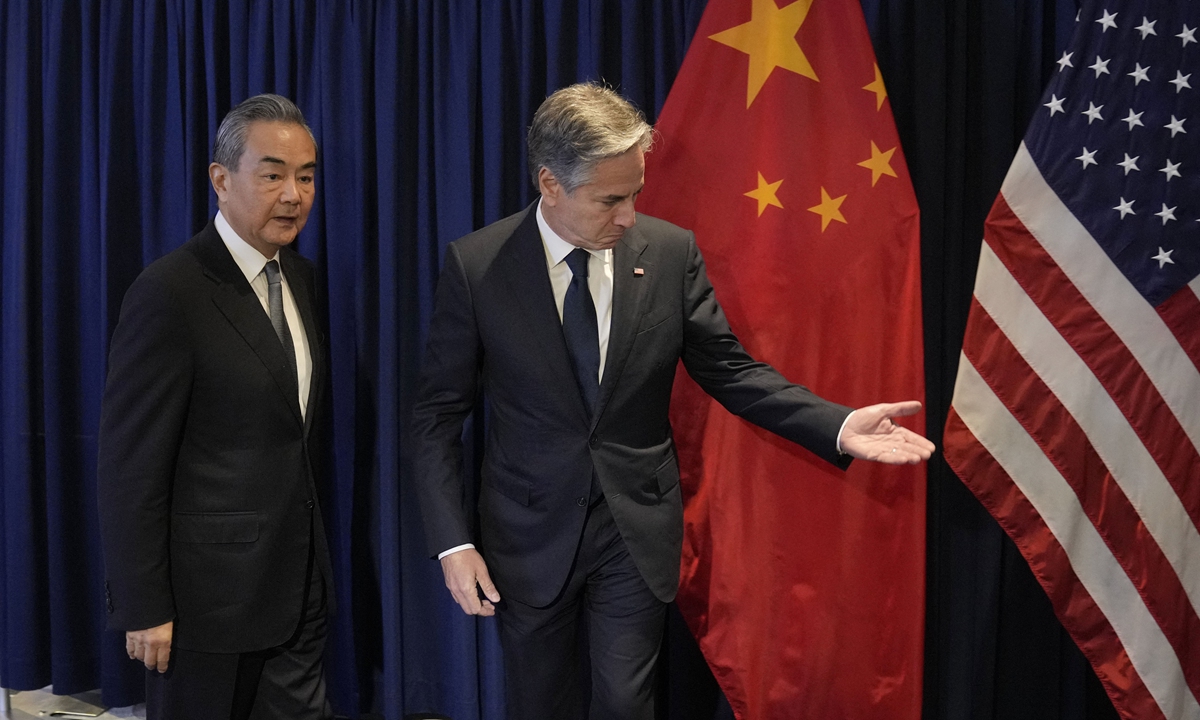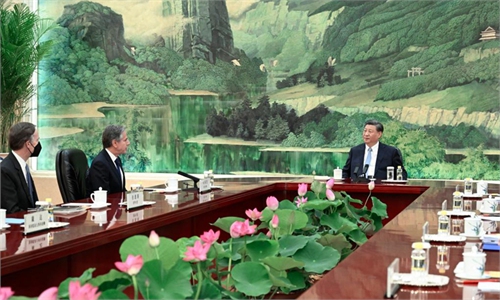Wang, Blinken meet; more high-level talks to be held
Washington needs to show ‘more sincerity’ to stabilize China-US ties

Wang Yi, Director of the Office of the Central Commission for Foreign Affairs of the Communist Party of China Central Committee, meets with US Secretary of State Antony Blinken on the sidelines of the ASEAN Foreign Ministers' Meeting in Jakarta on July 13, 2023. Photo: AFP
China and the US have been having increasingly frequent talks between senior officials recently and are expected to have more exchanges in various fields, such as diplomacy, finance, trade, climate change and maybe military in the future, but Chinese experts said that if US President Joe Biden wants to stabilize ties with China and hold another China-US summit later this year before the US presidential election, Washington needs to show more concrete sincerity through actions, otherwise the frequent meetings would not be productive.
On Thursday, Wang Yi, Director of the Office of the Central Commission for Foreign Affairs of the Communist Party of China Central Committee met US Secretary of State Antony Blinken again in Jakarta, Indonesia on the sidelines of a series of ASEAN foreign ministers' meetings. About a month earlier on June 19, they met in Beijing, where Wang warned Blinken that China-US relations are at a low point, and "the root cause is US misperceptions toward China, which has led to misguided China policies."
Also on Thursday, Shu Jueting, a spokesperson of the Chinese Ministry of Commerce, said that China is open to and welcomes US Commerce Secretary Gina Raimondo to visit the country, adding that "communication with the US in this regard is underway."
Experts said this would be a key to gauging to what extent the two countries can ease their tensions in the field of trade, while the recently ended visit of US Treasury Secretary Janet Yellen was more about macro economy and finance.
On Wednesday, China announced that "As agreed between China and the US, the US Special Presidential Envoy for Climate John Kerry will visit China from July 16 to 19."
Apart from diplomacy, finance, trade and climate change, China and the US also discussed the resumption of talks between the militaries of the two countries. Chinese Ambassador to the United States Xie Feng met with US Assistant Secretary of Defense Ely Ratner upon invitation on Wednesday, according to the website of the Chinese Embassy to the US.
Xie urged the US to remove obstacles and manage differences with concrete actions, prudently handle important and sensitive issues such as the Taiwan question in accordance with the principles enshrined in the three China-US joint communiqués, and work with China in the same direction to gradually bring "state-to-state and military-to-military relations back to the right track."
China's sincerity shown
All of these signs show that the consensus reached by the two heads of state in Bali last November has been implemented step by step, at least in terms of resuming dialogues between senior officials in different sectors, and China has shown its sincerity in meeting the US' desperate demands for talks despite Washington not yet correcting its mistakes, which deeply harmed bilateral ties, Chinese experts said.
Jin Canrong, associate dean of the School of International Studies at the Renmin University, told the Global Times on Thursday that the reason why the Biden administration is desperately seeking talks with China on all fronts is that the White House wants to manage and stabilize the worsening ties with China, because if Biden wants to win next year's presidential elections, he doesn't want to see any extreme incident or even direct conflict occurs between the two countries.
More importantly, the US will host the APEC leaders meeting later this year, and "Biden wants to use this chance to win credit for his reelection, and if he realizes another China-US summit in America, that would be key for him to proving that he has more capability than his Republican competitor in handling complicated ties with China," so before that, he needs his senior officials to lay the foundation for a summit with President Xi Jinping, Jin said.
According to the US State Department website, the APEC Economic Leaders' Meeting is scheduled to be held November 15-17. Observers said that ahead of this meet, in September, there will be another chance for Biden to hold a summit with Xi in India on the sidelines of the annual G20 summit, and this is why US senior officials are coming to China one after the other to create conditions for this to happen.
"China also wants to stabilize ties with the US, to make sure that tensions won't get out of control, and during the presidential elections, China-US ties usually get impacted, so we also want to try our best to fix ties as much as possible before those uncertainties emerge in 2024," Jin noted.
In addition, "by accepting the US' requests for talks, China also shows the world, especially those countries deeply concerned about worsening China-US ties, that China has done its part to ease tensions," said Lü Xiang, an expert on US studies and a research fellow at the Chinese Academy of Social Sciences.
Actions needed from US
Frequent meetings and nice words are not enough to bring a productive outcome, Chinese analysts warned. Diao Daming, an associate professor at the Renmin University, said, "If the US keeps saying one thing and doing another, it will be really hard to see bilateral ties getting stabilized." Diao told the Global Times on Thursday that "China won't refuse talks, but the US needs to implement what it says."
When the two sides are holding and arranging more talks, there are some noises within America looking to disrupt the efforts made by the two sides to reduce tensions, so to what extent the Biden administration can overcome these challenges and bring US-China ties back on the right track remain in question, experts said. Lü noted that "the closer we get to the election year 2024, the more and bigger obstacles will emerge. Biden needs to hurry up."
On Wednesday, a day before the Chinese Ministry of Commerce welcomed Raimondo's willingness for a visit, the US hyped news about attacks by "Chinese state-linked hackers" against around 25 US organizations, including at least two US government agencies, claiming that "Commerce Secretary Raimondo and senior officials at the State Department were victims."
The Chinese Foreign Ministry responded on Wednesday by saying that "the US is the world's largest hacking empire and cybercriminal", while urging the US side to expeditiously respond to attacks targeting China rather than spreading false information.
Experts said this just proves that at the same time as seeking talks with China, the US never ceases its acts of confrontation against China, and it's possible that some forces within the US are trying to interrupt the process of stabilizing China-US ties.
Lü said, "Raimondo's trip is key to gauging how much the Biden administration can do to actually stabilize China-US ties," and if the trip takes place and can produce a positive outcome, then there is hope for further recovery of bilateral ties.
Wu Xinbo, director of the Center for American Studies at Fudan University, told the Global Times on Thursday that the frequent meetings need to be transformed into concrete achievements to make the stabilization of China-US ties sustainable.
"For military ties, the US side should remove illegal sanctions against the Chinese defense minister, and stop their provocative activities in the regions around China and handle the sensitive Taiwan question in accordance with the principles enshrined in the three China-US joint communiqués. For economic and trade ties, they at least need to show sincerity by lifting additional tariffs on Chinese goods, and stop the unfair suppression against China's sci-tech development," Wu noted.
China-US interactions should be reciprocal, Wu stressed. "Without sincerity, there will be no conditions for another China-US summit," he noted.



